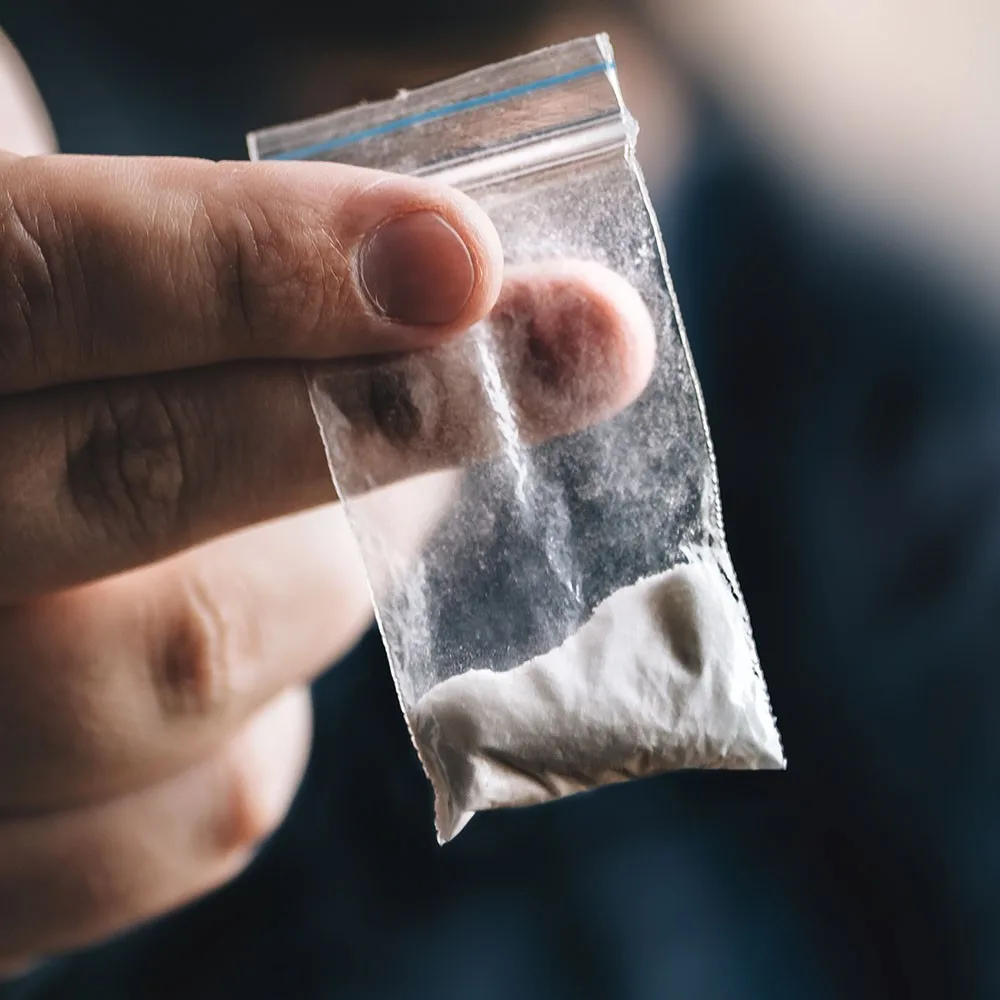
Drug dealer offers cocaine dose or another drugs in plastic bag, drug addiction on party concept, selective focus, toned. Picture for reference only.
A complex drug smuggling network has been exposed in Pakistan, involving not only the youth of upscale areas like Defence and Clifton in the metropolitan city Karachi of Pakistan but also businessmen, bureaucrats, politicians, and figures from the entertainment industry. Investigations reveal that this network operates on an international level, using well-known courier companies TCS and Leopard for drug transportation.
According to reports, Yahya, also known as Shah Ji, is a key operative of this network, responsible for procuring drugs from abroad and distributing them in Islamabad, Lahore, and Karachi. In Karachi, figures such as Bazil (who has fled abroad), Mustafa, Sahir, and Usman were involved in drug dealing.
Senior investigative journalist Taha Ubaidi has unearthed shocking details, said that the network trades in three types of high-end narcotics, with ‘Jungle Boy’ being the most expensive, sold at Rs 15,000 per gram. ‘Gelato’ and ‘Pamela’ follow, priced at Rs 12,000 and Rs 10,000 per gram, respectively. Karachi-based dealers earn a 30% profit, while Yahya, operating from Islamabad and Lahore, takes 50-55% of the earnings.
Reports indicate that Sahir Hassan used to sell 2,700 grams of narcotics per month, purchasing them for Rs 20.79 million and selling them for Rs 29.7 million, making a staggering monthly profit of Rs 9-9.5 million. Investigations also revealed a list of high-profile customers, including a woman who owns an expensive apartment in Defence and purchases an ounce (28 grams) of ‘Jungle Boy’ every month, amounting to Rs 1.34 million in monthly spending on drugs.
This network is not limited to elite circles; it has infiltrated educational institutions, including colleges and universities in Defence and Clifton, as well as other areas. Law enforcement officials claim that the case may soon be buried, but the long-term effects could devastate Pakistan’s youth.
Despite numerous statements from government and law enforcement authorities, no concrete actions have been taken, allowing the crisis to escalate. In elite households, parents struggle with their children’s addiction in silence, while the underprivileged suffer the worst, with their children succumbing to drug abuse on the streets.
These revelations expose the weaknesses in Pakistan’s drug enforcement system. Without urgent and strict action, this network will continue to expand, pushing the younger generation further into destruction.
On Tuesday February 25, the Sindh High Court has issued a written verdict on the prosecution department’s appeal against the Anti-Terrorism Court’s (ATC) decision in the Mustafa Aamir murder case.
According to court orders, the accused, Armaghan, was presented before the Sindh High Court, and the verdict highlights key aspects of the case: Records show that the investigating officer presented all evidence before the ATC administrative judge. The administrative judge rejected the physical remand request due to complaints of police misconduct.
The accused also complained of police torture before the Sindh High Court. Medical Examination: On court orders, the accused’s shirt was removed in the courtroom. The medical-legal officer’s report found no injury marks on the upper body but recorded bruises on the lower body, forehead, ear, and neck. However, the report did not confirm whether these injuries were caused by police torture.
Remand Controversy: The investigating officer stated that the accused was presented before the administrative judge on February 10 at 12 PM but had to wait three hours. The judge verbally instructed a medical examination instead of issuing written orders. The verdict states that the administrative judge had the legal authority to order both police remand and a medical examination.
Allegations of Procedural Misconduct: The remand order was allegedly altered using correction fluid (whiteout), changing it from police custody to judicial custody. The acting Prosecutor General informed the court that the accused’s father was present in the judge’s chamber at the time of remand. The court ruled that: The administrative judge exceeded his jurisdiction by ordering a Joint Investigation Team (JIT).
The decision to grant judicial remand instead of police remand was illegal. The High Court has ordered the removal of the administrative judge’s powers. A copy of the verdict has been sent to the Acting Chief Justice and the Home Secretary. For the sake of public interest and justice, another court should be assigned the administrative judge’s responsibilities.
Courtesy and Ref: https://www.facebook.com/share/p/15VHJuZzsR/?mibextid=xfxF2i
Apple today unveiled the MacBook Neo, its most affordable laptop ever, marking a significant expansion…
Cuba has formally charged six suspects with terrorism, alleging they operated a speedboat from Florida…
Nepal is set to hold its first national elections since a wave of protests last…
Pakistan: Field Marshal Asim Munir Reinforces Zero Tolerance for Cross-Border Terror In a visit to…
In a poignant display of public protest, the gardens outside Buckingham Palace have become an…
The United States has launched extensive airstrikes targeting Iran, striking more than 1,000 targets to…
This website uses cookies.